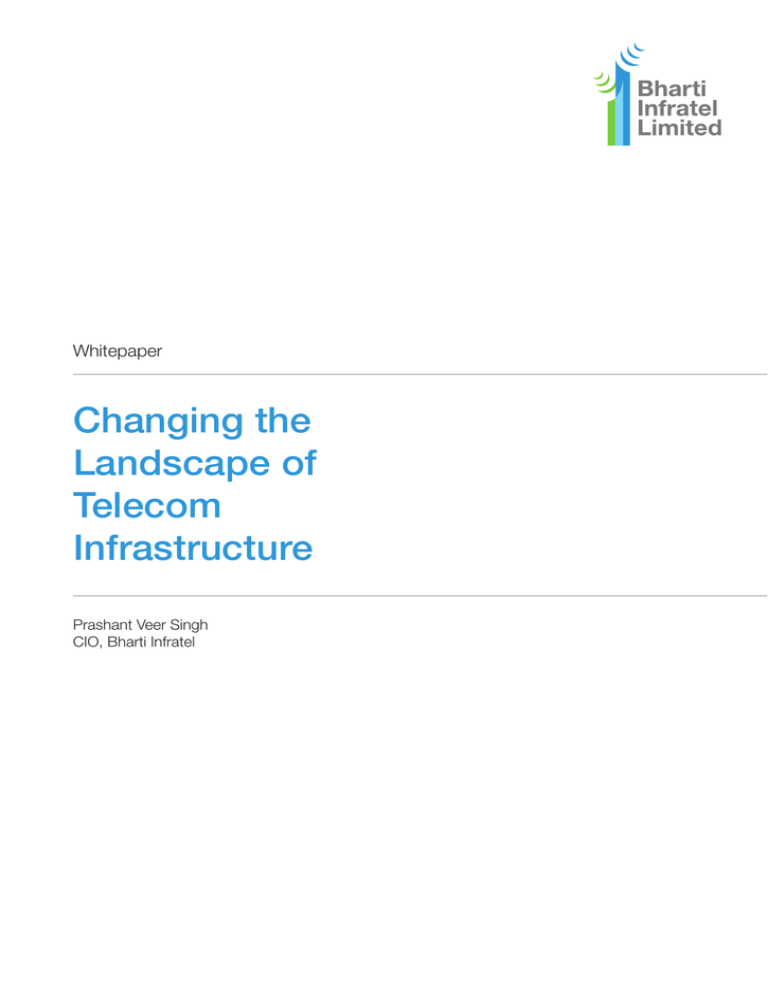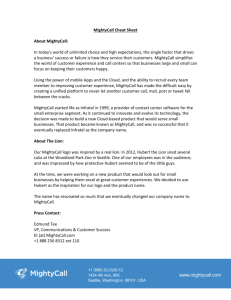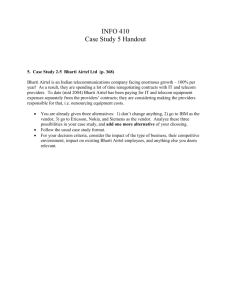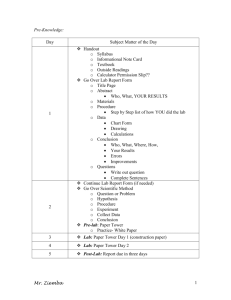
Whitepaper
Changing the
Landscape of
Telecom
Infrastructure
Prashant Veer Singh
CIO, Bharti Infratel
TABLE OF CONTENTS
Executive Summary
Section 1: Need for a ‘Tower Operations Center’
t Key Business challenges
t Business Objectives
Section 2: Architecting an effective solution
t Translating Business Objectives into a Process
Workflow
t 3IM Methodology
t Solution Architecture
Section 3: Benefits of the solution
t Business Benefits
t USP of the Solution
Section 4: Leveraging the Solution for maximum gain
t On the Operations Front
t On the Energy Front
©2011-12 by Bharti Infratel Limited. All rights reserved. Bharti Infratel and Bharti Infratel
Logo are trademarks or registered trademarks of Bharti Infratel Limited. All other company
and/or product names may be trademarks or registered trademarks of their owners.
Information contained in this document is subject to change without notice.
INFRATEL WHITEPAPER - CHANGING THE LANDSCAPE OF TELECOM INFRASTRUCTURE
2
EXECUTIVE SUMMARY
Telecom Tower Business: The Natural Evolution
Mobile telephony in developing countries like India plays a pivotal role
in not only connecting most corners of the map, but also spurting
economic activity and development across the society. Its fast paced
penetration in India is a story remarkably ready to be replicated across
other continents and geographies untapped of telecom benefits.
Whilst the growth for the Indian telecom sector has been rapid, the
evolution of its business models has been equally dynamic. The
mobile operator companies’ (OpCos) instinctive priority was increasing
subscriber base and thus the spotlight was more towards marketing
their services. Speedy network expansion was the next point of focus,
and active equipment service providers, the next natural partners of
OpCos. This is when the ecosystem needed another key partner to
manage its backbone.
TowerCos brought in optimal utilization of infrastructure, and significant
Capex saving opportunities for OpCos to help focus on increasing
reach to their end-users. OpCos had a clear need:
t Faster time to market
t Higher site-uptime
t Lower energy cost
Also, in a situation where telecom penetration was fast exceeding grid
power penetration / availability, it was getting increasingly tough to
sustain the spiralling energy costs.
The Tower industry while tasked with managing the challenge of
stabilizing its nascent operations model, had to build from scratch
its business and operational processes which were mostly manual in
nature due to the spread across tough terrains and remote locations
– both rural and urban. Even though an efficient management model
existed for the active infrastructure through the OpCos’ NOC or of
the active equipment partner, the TowerCos were operating under the
native norm of site assets being serviced on an ad-hoc reactive basis.
The bar however had to be raised, as Infratel took its leap in plucking
learning’s from the NOC model, and pioneering the development of its
very own Tower Operations Center, in partnership with IBM. Infratel’s
TOC was meant to automate the monitoring and management of its
wide tower footprint and enable a proactive asset maintenance for
achieving higher uptime, and reducing the energy costs.
INFRATEL WHITEPAPER - CHANGING THE LANDSCAPE OF TELECOM INFRASTRUCTURE
If cables are the lifelines
of telecommunications,
then towers stand as the
backbone to the wireless
communications industry.
Creating a world-class
O&M (Operations and
Maintenance)
Bharti Infratel’s Network
Operations Center – also
called Tower Operations
Center - leverages realtime intelligence and a
highly efficient workflow
to create a world-class
O&M (Operations and
Maintenance).
This has helped
Infratel maximize site
uptime; optimize fuel
consumption and
minimize operational
costs.
3
SECTION 1
NEED FOR A ‘TOWER OPERATIONS CENTER’
Key Business challenges
Tower operations and asset management being the core business
for tower infrastructure companies, the main business challenges
were as follows
t Telecom penetration far exceeding Grid power availability
t Highly decentralized and manpower intensive operations
t Tough logistics supply chain for remote areas
t Difficulty in tracking and managing SLAs for customers
t Lack of operational visibility affecting long-term planning and
strategic improvements
Business Objectives
The Tower Operations Center (TOC) was then conceptualized with
clear objective in mind:
t Centrally monitor and manage Infratel’s large, distributed tower
infrastructure
t Use IT as an enabler in pioneering the monitoring and
automation of operations in telecom infrastructure
t Reengineer and integrate operational processes with ERP
t Innovate and create a key product differentiator
t Proactively monitor and manage SLAs committed to customers
and stakeholders
t Drive improvements through improved operational visibility,
energy analytics, usage and fault patterns, process metrics,
vendor performance etc.
INFRATEL WHITEPAPER - CHANGING THE LANDSCAPE OF TELECOM INFRASTRUCTURE
Once the basic
objectives were
established, a highlevel implementation
plan was created to
convert the business
goals into a series of
technical ‘To-Do’s.
Best of breed software
applications and
hardware components
were incorporated into
the workflow to convert
raw data into real-time
intelligence
4
SECTION 2
ARCHITECTING AN EFFECTIVE SOLUTION
Translating Business Objectives into a
Process Workflow
The solution follows a ‘3IM Methodology’ where
Instrumentation, Interconnect and Intelligence come
together to achieve better Management.
1. Sensors placed at site in the NMS (Network Management
System) box sense minute changes in the normal functioning
of a tower site - like changes in temperature, door to the DG
room being open/close etc. The NMS then polls the data from
these sensors and communicates the same instantly, in realtime, to the TOC, using GPRS. In case the GPRS server is not
able to establish connectivity with the TOC due to any glitches,
it’s programmed to make two more attempts, failing which an
SMS can be sent from the NMS. These events are continuously
generated throughout the day, from as many as 35000 sites,
continuously reporting site conditions, status updates and
energy readings.
2. A homegrown application converts the SMS and GPRS feeds
from the NMS and OSS systems received from all circles that are
in a binary format, into a text format.
3. All the event data is fed continuously in real-time to a Centralized
Monitoring system. Here, a ‘Rule Engine’ (the brain of this
solution) analyses the data using business rules that pertain to
management of the passive infrastructure and converts the data
into ‘actionable intelligence’ that is then used to drive process
workflows, and relayed to the on-site workforce for issue closure.
Challenges faced while
deploying the solution:
- Deployment of tools
and instrumentation
for the project, across
a large geographic
footprint, including
some tough terrain
- Integrating a wide
range of sensors,
from different solution
partners, and for
different kinds of sites,
through effective
program management
- Lack of a standard
protocol for
communicating with
NMS
- Extensive training
of the field force on
usage of the solution
and associated
instrumentation
4. Based on this data, an analytics layer processes all the
infrastructure and process data and provides insights on process
performance, asset performance and energy analytics. This
helps Infratel identify opportunities for energy optimization,
detect irregularities, and proactively prevent service outages.
This helps in better Incident Management, Asset Management
and Energy Management.
INFRATEL WHITEPAPER - CHANGING THE LANDSCAPE OF TELECOM INFRASTRUCTURE
5
3IM Methodology
INSTRUMENT
INTERCONNECT
INTELLIGENT
MANAGEMENT
Sensors
GPRS
Alarm View Engine
Alarm Management
Energy Meter(AC/DC)
SMS
Rule Engine
Incident Management
Battery
OSS
Asset Management
Energy Management
Remote Terminal
Unit(RTU)
Aggregator
Engine
Asset Management
Ticketing Engine
Power Interface Unit
(PIU)
Analytics
Over-the-Air (OTA)
Generator
Air Conditioner
Rectifier etc
Solution Architecture
RULES ENGINE
REAL-TIME
MONITORING
INCIDENT & ASSET
MANAGEMENT
MIDDLEWARE LAYER
SITE DATA,
ALARMS
COMMAND AND
CONTROL
SENSOR LAYER
TOWER INFRASTRUCTURE
Incident Management
and Alarm
Management
Proactive reporting
of incidents before a
site goes down, and
reactive reporting on a
site when it’s down
Asset Management
and Outage
Management
Real-time/frequencybased preventive
maintenance as
well as breakdown
maintenance of on-site
assets
ANALYTICS
OPERATIONAL
PROCESSES
In short, the TOC
automates the Tower
management process
and workflows which
help in better:
Energy Management
Identify opportunities for
Energy Optimization
Fraud Detection
Detect incidents
of willful sabotage,
manipulation or
ineffective handling of
an asset or issue - by
the onsite workforce or
3rd party vendors
DISTRIBUTED, MOBILE WORKFORCE
INFRATEL WHITEPAPER - CHANGING THE LANDSCAPE OF TELECOM INFRASTRUCTURE
6
SECTION 3
BENEFITS OF THE SOLUTION
By implementing the TOC, Bharti Infratel has been able
to successfully achieve all the major objectives that were
outlined when the project was conceptualized.
The TOC has helped Infratel remotely manage its equipment assets
at the tower sites better and monitor the tower sites and incidents
generated on a real-time basis effectively, resulting in improved
operations, savings and increased Customer Satisfaction. Further,
with continuous monitoring of fuel and energy usage, and adoption
of various green technologies, it has helped significantly reduce
greenhouse gases emissions and contribute to a greener and
healthier environment.
Business Benefits of the Tower Operating Center
TO BHARTI INFRATEL
TO THE CUSTOMER
REAL-TIME
MONITORING
HIGHER UPTIME
EARLY
DETECTION
STABLE NETWORK
BETTER
ASSET LIFE
SINGLE POINT OF
CONTACT
USP of the solution
The TOC is state-of-theart implementation of a
NOC tower infrastructure
(Network Operations
Center) and is the first
of its kind anywhere in
world which integrate
Instrumentation,
Interconnect protocols,
and Information
Technology for better
operations Management
Through “intelligent
automation” of
infrastructure
management and various
operational processes, the
TOC provides a wealth
of insights to drive asset
performance and energy
efficiency. This has helped
Bharti Infratel achieve
significant business
benefits while at the
same time contributing
to a cleaner and greener
environment
BETTER CAPEX/OPEX
PRODUCTIVITY
PROCESS
EFFICIENCY
HIGHER
PROFITABILITY
HAPPY
CUSTOMERS
INFRATEL WHITEPAPER - CHANGING THE LANDSCAPE OF TELECOM INFRASTRUCTURE
7
SECTION 4
LEVERAGING THE SOLUTION FOR
MAXIMUM GAIN
On the Operations Front
On an average, nearly 2 million events are transmitted every day
through the firmware, continuously reporting site events and
conditions, status updates and energy readings.
The Rule Engine (the ‘brain’ of the TOC) is designed to receive
these inputs in parallel, analyze them and generate 1 or 2 action
items for the site, for the day. These are then communicated to the
field staff directly, resulting in a quicker and better responses from
an earlier turn-around time of ‘a few hours’ to just ‘a few minutes’.
TOC is now also integrated with Infratel’s ERP systems for providing
and overall energy management solution – along with automated
business process for enhanced savings on energy opex and an
improved breakdown maintenance. Additionally, our GreenTower
P7* initiatives have also been mapped to the TOC to aid further
improvements.
Operational impact of
the solution
Telecom grade uptime of
99.9% across Infratel’s
tower network
Upto 50% reduction in
outage incidents per site
per month in a year
Reduction in average
critical incidents upto 30%
On the Energy Front
Apart from reducing the OPEX / CAPEX on the operations front, the
TOC has also had a significant impact on the environment and has
made a case for ‘Greener Telecom’.
t Significant savings (on account of fuel) to the tune of USD 1.23
million/year by minimizing DG failure, helping negate and reduce
‘extra run-hours’
t This is not only a direct saving on the fuel cost, but it also helps
reduce CO2 and greenhouse gases emitted to the tune of 4.08
million kgs per year
On the billing front
t This has helped save more than 35000 field trips per year, while
also increasing accuracy and reducing delays in billing
t Accurate tracking of DG/Mains/Battery usage across all sites has
further helped save more than 5000 DG run-hours
*Infratel’s GreenTower P7 initiative is a pioneering effort within the telecom tower industry,
and is aimed at using alternate, renewable and energy efficient technologies for powering
its tower footprint. To know more log on to bharti-infratel.com/web/gogreen
INFRATEL WHITEPAPER - CHANGING THE LANDSCAPE OF TELECOM INFRASTRUCTURE
8
ABOUT BHARTI INFRATEL
Bharti Infratel Limited is one of the world’s leading telecom tower infrastructure
service providers. It deploys, owns and manages telecom towers and
communication structures, for various mobile operators across 18 states of
India. It has a vast footprint of over 33,000+ towers and holds a 42% stake in
Indus Towers Limited – a Joint Venture between Bharti Infratel, Vodafone &
Idea Cellular.
Download this whitepaper from:
www.bharti-infratel.com > Media > Knowledge Dock
Bharti Infratel Limited
901, Park Centra,
Sector 30 NH-8,
Gurgaon
Haryana - 122001
http://www.bharti-infratel.com
Bharti Infratel and the BIL logo are trademarks of Bharti Infratel Limited. Bharti Infratel
reserves the right to revise, change or update this document without notice. Bharti
Infratel underatakes no responsibility for any inaccuracies in the information presented
in this document.
© 2011-12 Bharti Infratel Limited | All Rights Reserved
INFRATEL WHITEPAPER - CHANGING THE LANDSCAPE OF TELECOM INFRASTRUCTURE
9





